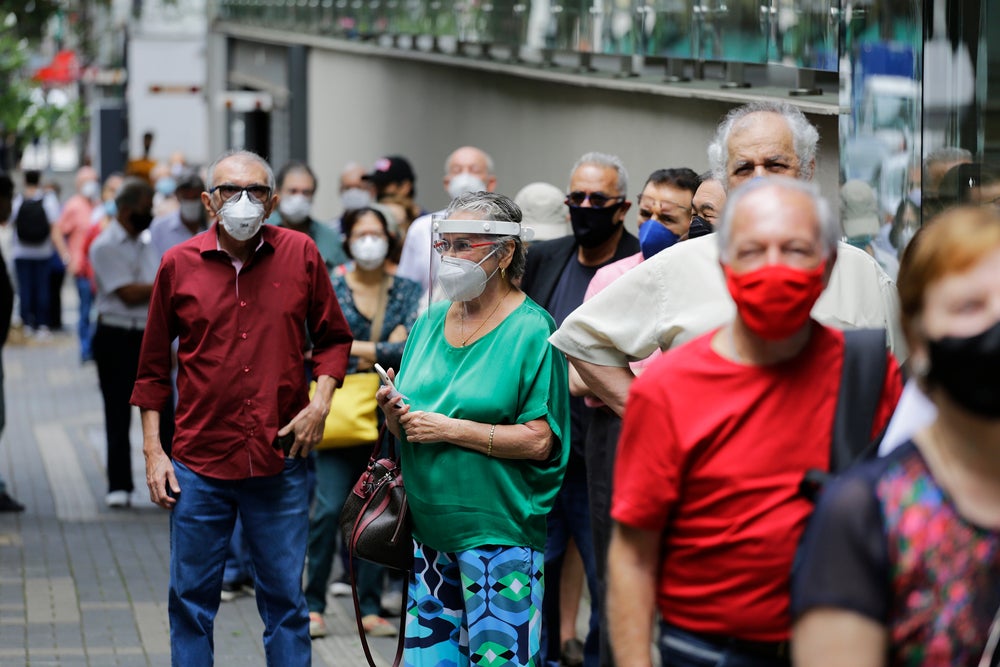
Need to Know:
- Upper middle-income countries not in Merck’s voluntary license deal include Argentina, Columbia and the Dominican Republic.
- Without deals to prepurchase molnupiravir, these countries could face steep price tags set by high-income countries.
- The agreement includes a clause that could preclude patent challenges from manufacturers who sign into the contract.
As Merck and Ridgeback Biotherapeutics sign on to a licensing deal to expand global use of their Covid-19 capsule molnupiravir, many upper middle-income countries could fall through the cracks.

Discover B2B Marketing That Performs
Combine business intelligence and editorial excellence to reach engaged professionals across 36 leading media platforms.
Merck and the Medicine Patent Pool (MPP) last week announced a voluntary license for the generic manufacturing and sale of molnupiravir that covers 105 countries. Under the agreement, generic manufacturers can receive nonexclusive sublicenses to produce the antiviral. While many experts lauded the deal, some noted upper middle-income countries not covered in the agreement are left in a difficult position.
The agreement covers all low-income, most lower middle-income, and some upper middle-income countries (UMIC), according to the MPP. But almost half of the world’s population falls outside the deal, notes Yale School of Medicine drug policy expert Dr Reshma Ramachandran. Specifically, this is where 70% of all Covid-19 infections in the first half of 2021 occurred, she adds.
In Latin America and the Caribbean, over 80% of the population falls outside the agreement, according to an analysis from the Knowledge Ecology International (KEI). “Leaving out countries like Argentina or the Dominican Republic is the negative side of an overall positive agreement,” says KEI senior researcher Luis Gil Abinader. Brazil, an UMIC, is in separate negotiations with Merck. High-income counties in the region include Chile and Barbados.

US Tariffs are shifting - will you react or anticipate?
Don’t let policy changes catch you off guard. Stay proactive with real-time data and expert analysis.
By GlobalDataFor countries outside the deal, there is concern that wealthier countries with more purchasing power will corner the molnupiravir supply, says Drugs for Neglected Diseases Initiative North America executive director Rachel Cohen. High-income countries like the US and UK have already entered molnupiravir prepurchasing agreements, raising concerns of “dose hoarding” seen with mRNA Covid-19 vaccines, she notes. The EMA has started a rolling review for molnupiravir and the FDA is holding an Advisory Committee meeting to discuss its data on 30 November.
However, the licensed area is large enough to induce generic entry, and the countries that were left out of Merck’s deal can benefit from that, Abinader says. But the deal’s fine print—specifically a clause that could curtail patent challenges from sublicensed manufacturers—left other experts more wary. Merck did not respond to a comment request.
High-income countries may set price
Without a sublicense to produce molnupiravir, many UMICs will have to directly compete with high-income countries for supply, Ramachandran says. Similar to the case with mRNA vaccines, high-income countries with more purchasing power could buy excess doses of molnupiravir, Cohen adds.
Expensive price points in high-income countries can set benchmarks for pricing in UMICs, Cohen says. In its initial molnupiravir prepurchasing agreement, the US will pay $712 per five-day treatment course. This is despite KEI estimating the drug costs less than $20 to produce. The Institute for Clinical Effectiveness Research declined to comment to this news service on molnupiravir’s cost effectiveness until its draft evidence report is published in early February.
There is the risk of UMICs paying more than high-income countries. Drug makers can try to set a product’s price as high as possible, as there are UMICs that could meet an even higher price. As an example, South Africa paid more for the AstraZeneca Covid-19 vaccine than the UK because the latter had a purchasing agreement with the company, explains Johns Hopkins University drug coverage and access expert Dr Mariana Socal.
Once initial purchasing agreements are fulfilled, molnupiravir’s price would be determined by the clinical experience, available evidence, and public opinion at that time, experts noted. Pfizer and BioNTech secured a higher price for their Covid-19 vaccine once they had effectiveness data in millions of people.
Patent provisions draw some concerns
The agreement provides a pathway for supplying molnupiravir to countries outside the licensed territory, where patents have not been granted, Abinader says. Under international law, individual countries can reject patents and grant compulsory licenses, he explained.
But Merck and MPP’s agreement includes a clause that could prevent sublicensed generic companies from contesting molnupiravir patents, Cohen notes. This would preclude manufacturers who sign on to the terms of the sublicensing deal from challenging patents to facilitate generic production, she says.
Emory University, whose researchers invented molnupiravir, pushed for allowing the MPP to terminate sublicensing agreements with any manufacturer that contests the patent, Ramachandran says. There’s some reassurance from the MPP that it won’t exercise this right as it runs contrary to its core principles, she notes. “But it’s disappointing to see a university that received significant amounts of taxpayer money to discover and develop this drug promoting anti-access provisions in this license," she adds.
While such an agreement does not address global access completely, every bit counts.
Still, while such an agreement does not address global access completely, every bit counts, says University of Illinois professor of law Jacob Sherkow. Work needs to be continued to develop solutions for the remaining countries, he adds.
Experts interviewed by this publication commended the transparency of Merck’s agreement as it is publicly accessible. But the lack of detailed clinical trial data—including the drug’s ideal patient population—makes it difficult for countries to plan molnupiravir’s eventual rollout, they added.
On 22 September, this news service reported it was critical to test and identify eligibility for molnupiravir early in disease progression. Healthcare providers’ interpretations of severe Covid-19 risk factors will also prove key in determining the drug’s use.
Graphs by GlobalData data journalist Andrew Hillman




